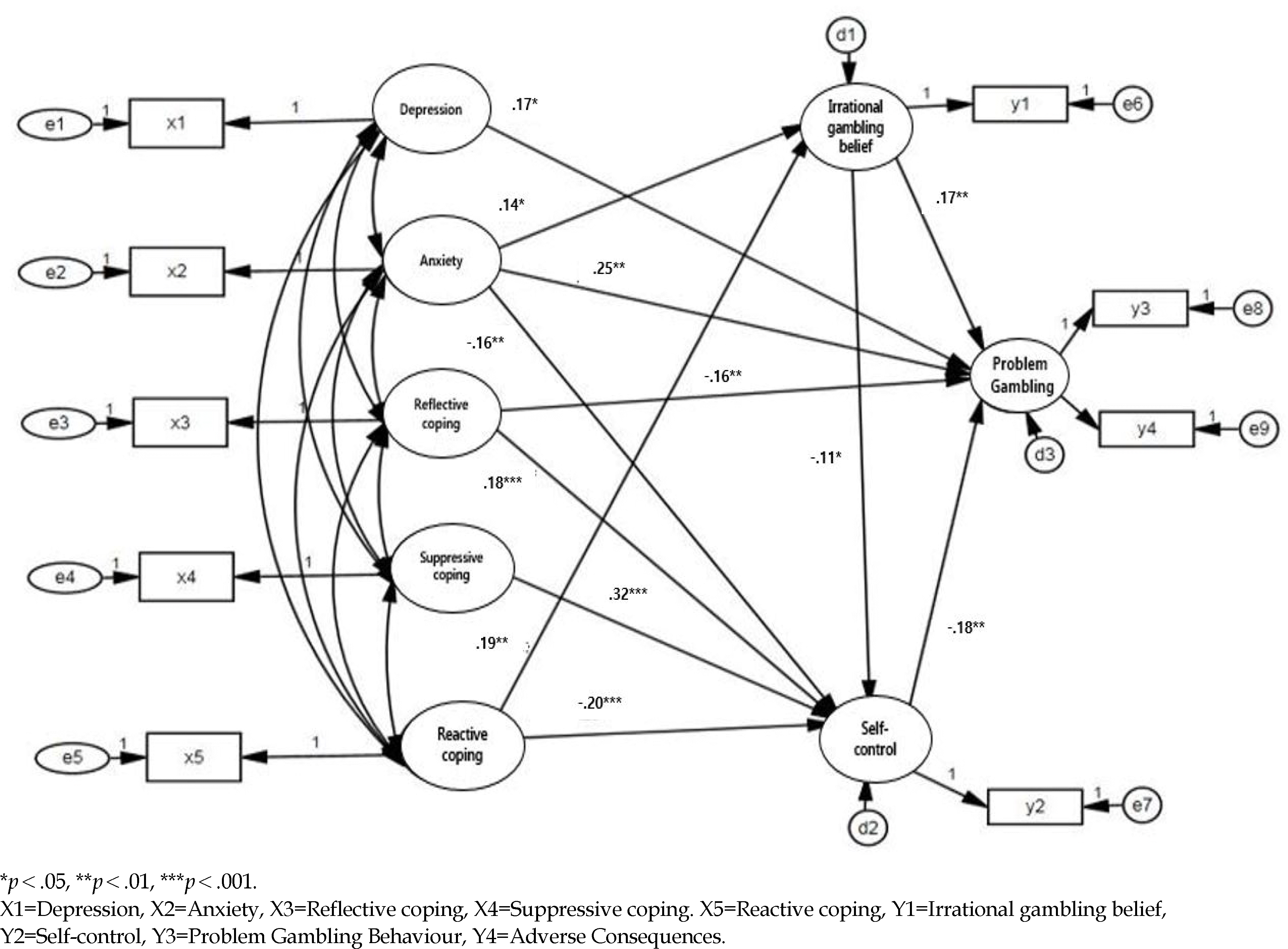Abstract
Purpose
A mediated model of Korean college students' problem gambling based on Blaszczynski and Nower’s pathway model is developed and tested to explore mediating roles of self-control and irrational gambling beliefs in the association between emotionally vulnerable variables and problem gambling.
Methods
273 student participants recruited from 4 universities in Seoul and Gyeonggi, Korea responded. Data were collected with a structured self-report questionnaire comprising measures of problem gambling, depression, anxiety, coping styles, irrational gambling belief, and self-control.
Results
The modified research model provides a reasonable fit to the data. Depression, anxiety, reflective coping, irrational beliefs, and self-control turned out to have direct effects on problem gambling, while indirect effects were reported in some suppressive and reactive styles. These predictors account for 38% of the college students' problem gambling.
References
1. Go JJ, Gwon SJ, Lee GO, Kim MJ, Jang EH. A survey on the actual condition of the national gambling industry in 2014. Health Hazard Evaluation Report. Seoul: The National Gaming Control Commission;2014. October. Report No.: 11-1371045-000042-11.
2. American Psychiatric Association. Diagnostic and statistical manual of mental disorders. 5th ed. United States: American Psychiatric Publishing;2013. p. 585.
3. LaBrie RA, Shaffer HJ, LaPlante DA, Weshsler HG. Correlates of college student gambling in the united states. Journal of American College Health. 2003; 52(2):53–62. https://doi.org/10.1080/07448480309595725.

4. Kwon BS, Kim YH. A study of gambling addiction and its actual conditions among university students in Korea. Mental Health & Social Work. 2011; 39:5–28.
5. Jang SM. Structural analysis on the path of problem gambling among college students: Using Jacob's general theory of addiction. Korean Journal of Social Welfare. 2013; 65(2):231–254.
6. Jung SY. The Structural Model of College Students' Gambling Behavior [dissertation]. [Daegu]: Daegu Catholic University;2011. p. 80.
7. Kim YH. Early maladaptive schema and coping style of pathological gamblers. Cognitive Behavior Therapy in Korea. 2009; 9(2):17–33.
8. Choi YS, Lee YH. Gambling attitudes and beliefs, gambling passion, coping style of college students. Catholic Journal of Social Science. 2004; 20:21–36.
9. Blaszczynski A, Nower L. A pathways model of problem and pathological gambling. Addiction. 2002; 97(5):487–499. https://doi.org/10.1046/j.1360-0443.2002.00015.x.

10. Jang JI, Yoon IN, Kim SB. The relationship between the stress and gamble addiction in college students: Test of moderating effect of self-control. Korean Journal of Youth Studies. 2014; 21(11):101–123.
11. Yoon IN, Jang JG, Kim SB. Study on the effect of university students' gambling motive and self-control ability on gambling addiction. Journal of Youth Welfare. 2014; 16(3):237–256.
12. Lee JI, Kwon JH. Effects of mindfulness based cognitive therapy on recovery of gambling addicts: A case study. Cognitive Behavior Therapy in Korea. 2015; 15(1):1–28.
13. Yoo CY, Kim EH. An explorative study of the pathways to problem gambling among college students: Focusing on social dysfunction and problem drinking. Journal of Social Science. 2014; 25(4):317–341. https://doi.org/10.16881/jss.2014.10.25.4.317.
14. Kim DJ. College students' gambling behavior: Mediating effect of self-control and multiple group analysis. Journal of the Korea Academia-Industrial cooperation Society. 2017; 18(6):197–208. https://doi.org/10.5762/KAIS.2017.18.6.197.
15. Heppner PP, Cook SW, Wright DM, Johnson WC. Progress in resolving problems: A problem-focused style of coping. Journal of Counseling Psychology. 1995; 42(3):279–293. https://doi.org/10.1037/0022-0167.42.3.279.

16. Kim YM. Impact of parent-child relationship and stress-coping on smartphone addiction in adolescents: Mediating effects of self control. Korean Journal of Local Government & Administration Studies. 2015; 29(1):223–242. https://doi.org/10.18398/kjlgas.2015.29.1.223.
17. Kim GS. Analysis structural equation modeling. Seoul: Han-narae Publishing Co.;2010. p. 565.
18. Ferris J, Wynne H. The Canadian problem gambling index. [Internet]. Ottawa: Canadian Centre on Substance Abuse;2001. [cited 2018 March 06]. Available from:. http://www.ccgr.ca/en/projects/canadian-problem-gambling-index.aspx.
19. Kim AY, Cha JG, Kwon SJ, Lee SM. Construction and validation of Korean version of CPGI. Korean Journal of Psychology: General. 2011; 30(4):1011–1038.
20. Chon KK, Choi SC, Yang BC. Integrated Adaptation of CES-D in Korea. Korean Journal of Health Psychology. 2001; 6(1):59–76.
21. Beck AT, Epstein N, Brown G, Steer RA. An inventory for measuring clinical anxiety: Psychometric properties. Journal of Consulting and Clinical Psychology. 1988; 56(6):893–897. https://doi.org/10.1037/0022-006X.56.6.893.

22. Kwon SM. Differential roles of dysfunctional attitudes and automatic thoughts in depression: An integrated cognitive model of depression [dissertation]. [Brisbane, AU]: The University of Queensland;1993. p. 636.
23. Breen RB, Zuckerman M. ‘Chasing’ in gambling behavior: Personality and cognitive determinants. Personality and Individual Differences. 1999; 27(6):1097–1111. https://doi.org/10.1016/S0191-8869(99)00052-5.

24. Yi IH. An investigation on validity of the gambling attitudes and beliefs scale: The Korean version. The Korean Journal of Health Psychology. 2005; 10(4):531–546.
25. Tangney JP, Baumeister RF, Boone AL. High self-control predicts good adjustment, less pathology, better grades, and interpersonal success. Journal of Personality. 2004; 72(2):271–324. https://doi.org/10.1111/j.0022-3506.2004.00263.x.

26. Hong HG, Kim HS, Kim JH, Kim JH. Validity and reliability validation of the Korean version of the Brief Self-Control Scale (BSCS). Korean Journal of Psychology: General. 2012; 31(4):1193–1210.
27. Lindberg A, Fernie BA, Spada MM. Metacognitions in problem gambling. Journal of Gambling Studies. 2011; 27(1):73–81. https://doi.org/10.1007/s10899-010-9193-1.

28. Rhee MG, Kim GH, Kim CN. Prevalence estimates, demographics and psychosocial characteristics of pathological gamblers: Focusing on comparing two communities in Korea. The Korean Journal of Health Psychology. 2003; 8(2):399–414.
29. Lee HP. The effect of irrational gambling belief to the pathological gambling. The Korean Journal of Clinical Psychology,. 2003; 22(2):415–434.




 PDF
PDF ePub
ePub Citation
Citation Print
Print



 XML Download
XML Download